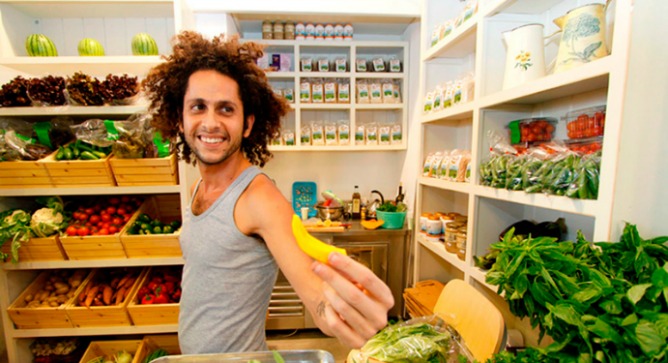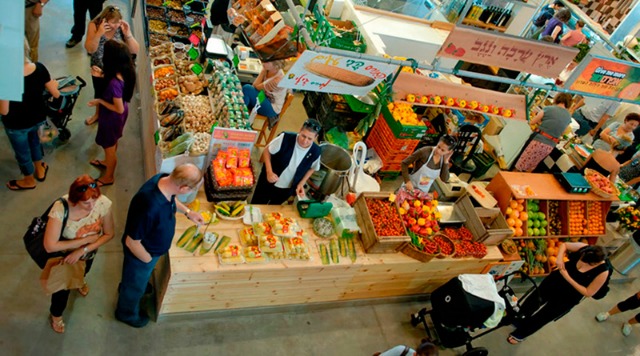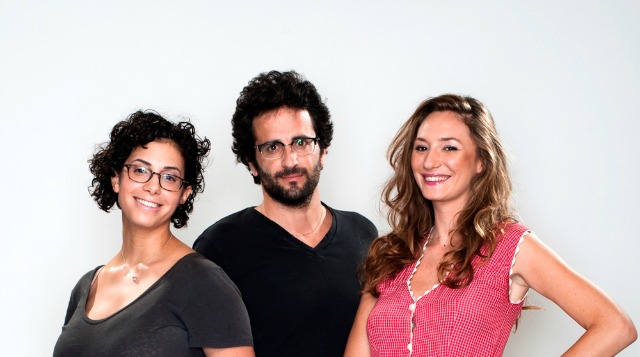On a walk through a farmers market in France, Israeli food journalist and entrepreneur Michal Ansky came across some of the most delicious-looking red tomatoes. When she asked the tour guide about them, she wasn’t expecting to hear that they were imported from Israel.
“In Israel, there are the best fruit and vegetables and herbs I’ve ever seen. But it doesn’t reach the customer. Usually the good stuff goes to export,” Ansky, who specializes in food products quality, tells ISRAEL21c. “There is no buyer diversity here.”
Spread the Word
• Email this article to friends or colleagues
• Share this article on Facebook or Twitter
• Write about and link to this article on your blog
• Local relevancy? Send this article to your local press
So Ansky, together with chef/journalist Shir Halpern and architect/entrepreneur Roee Hemed, founded Shuk Hanamal (Port Market) to give customers more choice, better products, and knowledge about where their food is coming from.
The one-stop shop for the best ingredients and produce is located in a hangar at the Port of Tel Aviv, overlooking the Mediterranean Sea. During the week, vendors in the covered market offer up local and seasonal fruits and veggies, specialty wines, cheeses, baked goods and fresh meat, fish and deli goods. There are also imported delicacies that are unavailable locally. Think Eataly in New York, but in Hebrew.
On Friday mornings, Shuk Hanamal welcomes the Tel Aviv farmers market vendors and it is culinary and gastronomic heaven for everyone. The small producers set up stalls packed with locally grown, exotic-looking, super-tasty fruits and vegetables that you don’t usually see in Israel.
Marketing markets
While the tradition of visiting a farmers market is part of day-to-day life in many parts of the world, Israeli shoppers tend to look to open-air city markets for the freshest produce.
But Carmel Market in Tel Aviv and Machane Yehuda in Jerusalem, for example, cannot be compared to a farmers market, the entrepreneurs behind Shuk Hanamal say.
“I love Machane Yehuda and Carmel Market, but they’re different,” says Ansky. “The sellers at these markets are vendors, not farmers. They bring produce from a warehouse. It’s grown industrially. You can get wonderful herbs but you can’t get kale or wild berries or white eggplant. You can’t get all the varieties you can get at a farmers market.”
Indeed, on any given Friday more than 70 farmers are there selling fresh produce.
The variety is astonishing, with some 15 kinds of cherry tomatoes (Israel, after all, improved the technology for cherry tomato production), purple carrots and potatoes, and other special varieties. There’s real dirt still caked on many of the leafier goods – a sign that it has come straight from the farm to your basket.
“People come from around the country to buy fresh produce at this market,” Halpern, a graduate of the Cordon Bleu in Paris, tells ISRAEL21c. “There’s a connection between the growers and the customers. It’s the place to feel the real character and soul of this country.”
“A farmers market offers a different experience and different produce,” says Ansky. “The farmers market is more rural and romantic in vibe.”
Take it slow
When Ansky and Halpern opened the marketplace in 2010, they had two main goals: to create a marketplace filled with organic and fresh goodness served up by those who grew the produce as can be found in markets around Europe; and to give customers more information about foodstuffs they’re eating.
Halpern says that from an ideological perspective, the market supports local producers. “The money goes straight to the cheesemaker or to the farmer or baker. There’s no middleman,” she says. “A lot of farmers cannot compete with the big chains. This is a different consumer experience.”
The ideology behind Shuk Hanamal is similar to that of the Slow Food organization, a non-profit association that promotes local food traditions and interest in the food people eat and where it comes from.
There’s a rule at the Tel Aviv market that the person who sells the produce must have had a hand in making or growing it.
“Someone who knows to tell you about the product, knows how it’s grown, where it’s from,” Halpern says. They encourage customers to ask questions about whatever they’re thinking of buying.
Even the building was designed in tune with the environment. Architect Roee Hemed designed this first green commercial building in Israel with the idea that wind turbines and solar panels will eventually generate and supply the energy needed to power the market’s needs.
While farmers markets around the world have seasons, thanks to Israel’s perfect weather – every day is market day here.
“It’s always exciting,” says Halpern. “It’s like a gastronomic amusement park.”
















